Two years ago, Croakey reported on an Integrated Care Symposium convened by the Australian Healthcare and Hospitals Association that sought to test the impacts of various health policy initiatives.
As Jennifer Doggett and Marie McInerney wrote at that time, such simulation events are a way of modelling changes within complex health systems, where such changes can often have unintended and unanticipated consequences given the complexity of interconnected health systems.
The AHHA recently convened another such simulation, and the LongRead below by Croakey editors and contributors who attended the event as rapporteurs, gives a rich insight into the complexity of challenges when seeking to reorient the focus of health and social systems towards consumers’ needs.
This is a pressing concern at a time when significant reforms in health, aged care, social welfare and disability are creating systems that are increasingly challenging for consumers to negotiate.
Below are “takehome quotes” about the day, from the Croakey #AHHAsim16 rapporteurs.
Summer May Finlay
“The simulation demonstrated to me that there is passion and drive among among those working in the health care sector to do the best by consumers. What it also showed was that even as a collective of health professionals we find it difficult to navigate the system because we don’t know all the contours of the landscape.”
Dr Ruth Armstrong
“At the simulation I saw a diverse workforce, united in its recognition of common obstacles, adept at responding to policy changes and willing to collaborate in finding solutions. But I also saw signs of weariness, as the all-too familiar scenarios raised intractable problems such as equity and resourcing, the solutions to which lay far outside the room.”
Jennifer Doggett
“Hearing the ideas coming from consumers, carers and other stakeholders at the simulation reminded me of how much creativity and innovation there is in the health, disability and aged care sectors, and how successfully people can generate solutions to their own unique problems when given the relevant information, tools and support.”
The article below was prepared for the Croakey Conference News Service.
Dr Ruth Armstrong writes:
A hotel perched above the major transport interchange of Roma Street Station in Brisbane provided an appropriate setting for a recent Cross Sector Care Simulation convened by the AHHA.
It was peak hour when I arrived, and as I looked out the window at the station – multiple train lines going in and out, buses disgorging passengers at the door and a snarl of traffic in the distance – it struck me that the scene provided a metaphor for the dilemma that had brought us all there.
How, in an era when both the health system and the problems of the people it seeks to serve are increasingly complex, can we best “do” health care?
We could perhaps view the patient/consumer/person as a passenger on a train, stopping in at the station to interact with the health system and moving on to the next station, or changing to another mode of transport for the journey towards the next episode of care. Indeed, for many people, that’s how it works.
But it’s increasingly recognised that this model can lead to fractured, siloed care, missed opportunities to improve health, and waste.
And what about the people who can’t afford a train ticket, or who face other barriers to accessing the train station?
As I contemplated the bird’s eye view of the transport hub, I wondered if the day’s events might point to a better way forward: a model with the patients at the centre, empowered to design their own systems of care from the services on offer around them.
Simulation goals
The plan for the day was for the 90-odd participants, representing various players in Australia’s health and social welfare sectors, to “simulate” their way through three scenarios involving people with complex health and social needs, with the aim of “developing recommendations to support greater integration, and patient-centred care”.
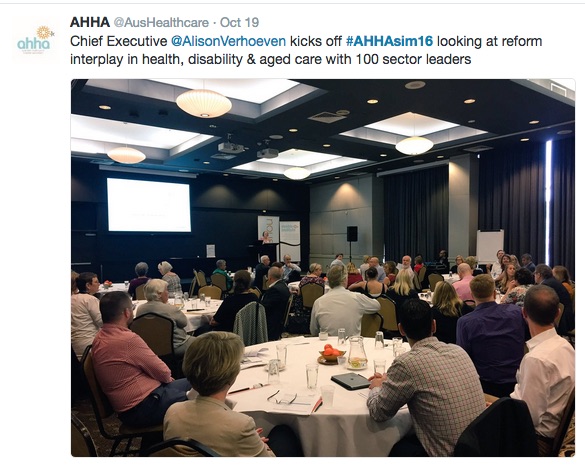 As well as an increasing number of people with complex needs, explained AHHA CEO, Alison Verhoeven, in the opening session, there have been “disparate reforms” in health and aged care, such as the National Disability Insurance Scheme, aged care reforms, chronic disease management initiatives, healthcare homes and changes to the public hospital sector.
As well as an increasing number of people with complex needs, explained AHHA CEO, Alison Verhoeven, in the opening session, there have been “disparate reforms” in health and aged care, such as the National Disability Insurance Scheme, aged care reforms, chronic disease management initiatives, healthcare homes and changes to the public hospital sector.
This has created increasingly complex systems for patients and service providers to navigate, and the overarching principle – that the person requiring care should be at the centre of it – is often overlooked.
Getting into role
Verhoeven described the simulation process as “like a murder mystery”: a role play of sorts, where players are given a set of circumstances and some history, and asked to collaborate to shed light on a problem.
We were split into three representative groups to discuss three scenarios for about an hour each, with a further short session to develop a report to bring back to the larger group.
It was a tough job for the team leaders keeping the players on track, and the rapporteurs observing, recording, synthesising and reflecting back.
As we split into our groups, the simulation facilitator, Penny Gregory, gave us three final instructions.
- Be honest (and no old hobby horses)
- Develop concrete recommendations
- Find one message to bring home.
New scenarios: familiar stories
Scenario one was designed to get the groups talking about possible funding models for Healthcare Homes. A self-managed $1000 capitation payment per year was introduced for patients receiving a chronic disease or mental health package. A person with a mental health issue has exhausted his allocation, but is experiencing an acute exacerbation of his paranoid delusions.
Scenario two dealt with aged care reforms. The State Government has decided that residential aged care facilities are no longer required to have 24 hour cover with on-site registered nursing staff, resulting in no RNs being rostered to work after 5pm. An aged care facility resident with a recent history of hospitalisation for recurrent urinary tract infections becomes unwell overnight and is transported to hospital.
Scenario three was designed to provoke discussion on the need or otherwise for ‘System Wranglers’ to help people navigate their way through complex health and social services systems. A role is envisaged, for someone to support and guide decision-making for people accessing bundled payments including through the NDIS, Aged Care and Health Care Homes. A middle-aged man with a partner and children, has multiple complex co-morbidities, including diabetes and hypertension. He has had a below-knee amputation due to his diabetes, and can no longer work.
Challenges and solutions across the health care system
Jennifer Doggett and Summer May Finlay write:
Common barriers and challenges were identified across all of the three scenarios, with a number of solutions being proposed by participants.
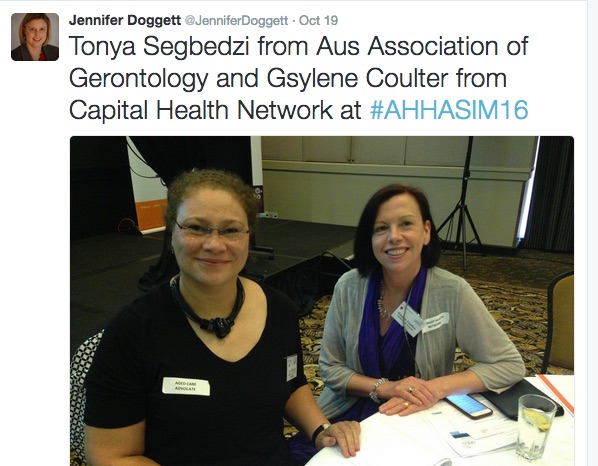 Participants discussed the need for a clear vision about the aims of current reforms, such as the NDIS, changes to aged care funding and the Healthcare Homes pilot.
Participants discussed the need for a clear vision about the aims of current reforms, such as the NDIS, changes to aged care funding and the Healthcare Homes pilot.
There was general agreement that – to a varying extent – these changes had the potential to significantly alter the way in which consumers experience health, aged and disability services, and to promote a more flexible, coordinated and consumer-centred system of care.
However, participants also noted that while some of the rhetoric used in relation to these reforms was similar (for example “consumer-focussed care”), these terms were not well-defined and that the reforms were progressing without any apparent shared vision or understanding of their desired endpoint.
Some participants felt it was important that the community develop a shared purpose for the reforms to guide their development and implementation.
The importance of focussing on the underlying values of health, aged and disability care in the context of the current reforms was stressed by a number of participants.
These values were seen by some participants as important in order to inform how the reforms were implemented and the way in which their eventual outcomes are assessed.
There was a discussion about the need to understand what the general public would see as important in the reform process and how this may differ from those directly involved in the health, aged and disability sectors.
There were differing views about the need to balance the values of the general community with those of consumers when developing and implementing changes to health care services.
For example, it was suggested that a set of “patient reported outcomes” should be developed to measure the success of the current reforms, as outcomes that were not defined by consumers may not reflect their needs and priorities.
A narrow definition of health
Overall wellness and quality of life were driving factors for consumers, carers and advocates, yet appeared not to be high on health professionals’ priority list.
Participants representing carers and nurses said that often the first signs of emerging problems in people with complex conditions occur outside of the health and formal care system, and are therefore often ignored.
They felt that health professionals often focussed exclusively on a narrow physical definition of health and their advice was restricted to services available within the health care system. This ignored consumers’ wish for them to work across sectors such as housing and social networks.
Solutions: The importance of considering the impact of non-health issues on health and well-being was discussed, including the role of social determinants, such as education, housing, social support and the environment, and how these should be reflected in any changes to funding for health, aged and disability services.
Complexity of the health system
One common theme that emerged was that the complexity of the health care system makes it near impossible to maintain the focus on the consumer, despite best intentions.
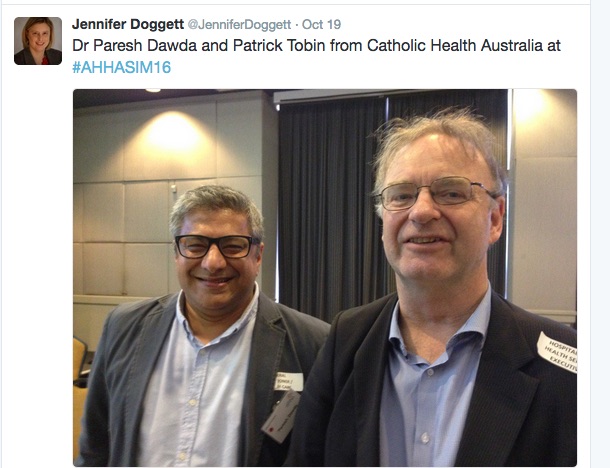 Reasons for this complexity include that: each consumer has a unique set of circumstances, physically, culturally, historically and socially; Australia’s federated system with a variety of funding streams from a variety of different funders; local geographical issues and politics; a patchwork of legislation, policies, strategies, plans and frameworks; different health sectors; and the variety of health professionals with a specific scope of practice.
Reasons for this complexity include that: each consumer has a unique set of circumstances, physically, culturally, historically and socially; Australia’s federated system with a variety of funding streams from a variety of different funders; local geographical issues and politics; a patchwork of legislation, policies, strategies, plans and frameworks; different health sectors; and the variety of health professionals with a specific scope of practice.
And to muddy the waters even further, each of the players has their own ideology and perspectives. Overall this translates to a system with a focus on the imperatives of health professionals rather than on those of consumers.
Unfortunately, the more complex a client’s needs and the more vulnerable they are, the more likely they are to get lost in the system.
While consumers often rely on health care providers to provide them with advice on their care options, they also reported that many providers were not aware of all aspects of the system and services that are available, and also often lacked access to patients’ full medical records.
There was general agreement that the changes being made within the health, disability and aged care sectors would place a greater burden on consumers (and sometimes their carers and families) to more actively manage their care.
Participants agreed there would be a need for increased support for consumers to ensure they were able to make informed choices.
However, there was no overall consensus about how this support should be provided in a way that reflects the diversity of needs and abilities of consumers in managing their care.
Solutions: data
The need for a clear map of all the points of intersection between different parts of the health and care system was discussed so that consumers and providers are aware of all the system and services that are available.
Some participants suggested that funding changes should aim to develop a more comprehensive and systematic approach to sharing relevant information across services and sectors, taking into account consumers’ desires for privacy.
It was agreed that this would support improved coordination of care but would also require a new and broader IT governance mechanism.
Solutions: technology
Technology was identified as a solution to many of the problems raised in the simulation, with discussions about the lessons that could be drawn from the success of Uber.
An Uber-like app for health and aged care or other technologies could help consumers and providers identify the services that were available in a particular area for a particular condition, and the best practitioners.
However, concerns were also raised about the potential risks of new ‘players’ from outside of the health system in suggesting or recommending health services to consumers who may be vulnerable and desperate for care.
Solutions: health system ‘wranglers’
There was an extensive discussion in all three scenarios about the potential for health system “navigators” or “wranglers” to support consumers to access and navigate the optimum mix of services.
This coordination or management role could be located with the patient, the GP, the Primary Healthcare Network, within hospitals and/or with dedicated new ‘health system wranglers’ positions.
The benefits of the health system “wranglers” role were seen to be that it would be focussed on the consumer and therefore (in theory) able to assess the different care options available from an unbiased perspective.
 However, if the position was located with (and/or funded by) another service provider, such as the GP or hospital, there were concerns that these roles could become just another way of diverting resources into this sector, whether or not this was in consumers’ interests.
However, if the position was located with (and/or funded by) another service provider, such as the GP or hospital, there were concerns that these roles could become just another way of diverting resources into this sector, whether or not this was in consumers’ interests.
Some participants noted there were already a number of roles in the health, aged and disability sector that helped with coordination and navigation, including social workers, mental health nurses and case managers (although these may not exist right across the system).
Participants argued it might be more effective to build on and extend these roles, rather than creating an entirely new position that could be filled by people with no experience of the health system.
In relation to the Health Care Homes pilot, participants discussed whether general practice was the best place to locate ‘health system wranglers’. Potential advantages included that GPs were community-based, accessible to the majority of the population, and had a broad experience of a range of health conditions.
However, some participants reported that GPs and practice staff had limited knowledge of non-medical services available in the community. They did not feel confident consumers would be made aware of all their care options if reliant on their GP for this service.
Once established, wranglers will be like all other health professionals and have a bias about what they do and act in order to maintain their power within the system – primary health care organisation representative.
Silos and funding
Silos in the health sector, reflecting, funding streams, competition, professional demarcations, and a lack of resources, were identified as a major barrier to the delivery of consumer-focussed care.
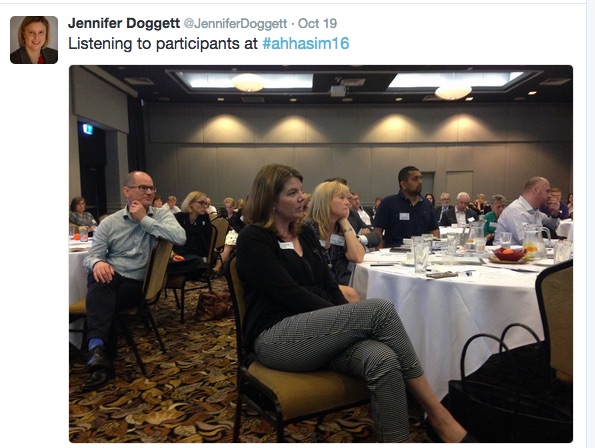 Unlike the Aboriginal Community Controlled Health sector and community health services in Victoria, mainstream services are not a one-stop shop. Consumers often need to see a number of health professionals in various locations, reducing continuity of care and placing a burden on consumers and carers.
Unlike the Aboriginal Community Controlled Health sector and community health services in Victoria, mainstream services are not a one-stop shop. Consumers often need to see a number of health professionals in various locations, reducing continuity of care and placing a burden on consumers and carers.
Patients and carers also reported they were often required to provide the same information about their medical history and personal details to each new health care provider and/or service.
The lack of coordination and sharing of data between service providers and sectors created additional work for consumers, and increased the potential for adverse events due to data gaps or errors.
A lack of collaboration was another outcome of health care siloing, and created gaps in the system with no one taking responsibility, meaning often the consumer suffered.
Nor did there appear to be much coordination between the different reform processes or any attempt on the part of government to integrate them to achieve shared goals.
This was a particularly important concern, given the need to improve the coordination of care for people with chronic and complex conditions.
The lack of coordination across sectors in developing and implementing the separate reform processes that, in some cases, target the same group of consumers, was seen as a major barrier to improving the care of people with chronic and complex conditions.
In relation to funding silos, some specific limitations with current models were identified as:
- Co-morbidities not reflected in payment system
- Lack of flexibility to move funding across services and sectors
- Lack of incentive for providers to invest in prevention
- Paying for services, rather than outcomes, which rewards throughput rather than quality care
- Lack of established ways of measuring quality in a way that reflects consumer experience
- No mechanism to support innovation (one participant reported that his service has over 60 funding streams but he is not allowed to innovate across funding boundaries.)
A number of examples were given about how existing funding models created barriers to providing cost-effective and consumer-focussed care.
Solutions
For all three scenarios, participants identified a number of ways in which a more flexible funding system could have prevented the escalation of health problems and the need for more intensive (and therefore more expensive) care.
Participants agreed that the policy intent of new funding systems, such as the NDIS, was not to simply develop a new way of paying for the same services as before, but to increase access and choice for consumers in order ultimately to improve outcomes.
Specifically, they felt that currently there were few incentives for service providers to deliver more integrated care, and that for this to change, funding would need to be allocated directly to support coordination and integration.
The relative benefits and disadvantages of different funding models were discussed, particularly in relation to the care of people with chronic and complex needs.
For example, participants agreed that a capitation model provides an incentive to find best value care, although some also argued it could create perverse incentives.
They were concerned that a third-party fund holder (for example a GP) may have an incentive to save resources and withhold access to services in case patients have an acute exacerbation in the future, even though earlier access to care may prevent the future escalation of the condition.
Some participants argued that some patients’ conditions are inherently unstable and unpredictable, and that a capitation model may be unsuitable for such cases.
One solution suggested was that episodic payments could be used to supplement capped payments to ensure that patients with unexpected needs do not miss out on necessary care.
However, it was pointed out that this increased the potential for fund holders to ‘game’ the system, and so provisions for this supplementary payment system would need to be closely managed.
Views differed in relation to the overall level of funding required. Some participants thought that current levels were adequate and that the issue was more efficient allocation, and others thought there was not enough funding overall and that the focus should be on influencing governments to increase the level of resources for health, aged and disability care.
However, all participants agreed that we need to get much better at measuring the costs and benefits of some of the policy approaches and their consequences and that funding systems needed to support pro-active intervention to prevent the development of more serious illnesses, even when this may involve non-health care measures.
Workforce issues
Workforce shortages were a consistent theme, particularly for consumers in rural and remote areas.
In relation to Scenario 2 (aged care reforms), participants discussed the key role of the GP in coordinating care. Participants representing GPs noted that many GPs do not want to provide services in aged care facilities or after hours, due to inadequate remuneration, family un-friendly hours, professional isolation and a lack of a career pathway.
Solutions: Workforce solutions discussed in relation to the three scenarios included changing the way the existing health workforce is used, as well as creating new positions to fill emerging consumer needs.
Participants canvassed the potential for nurse practitioners and specialised nurses in specific areas (such as breast cancer, mental health, general practice) to play a greater role in treating patients, particularly in rural and remote areas.
However, this “intermediate” category of health professionals (including nurse practitioners, paramedics and Aboriginal Health Workers) required increased training and support. Defining and monitoring their scope of practice was also seen by some participants as vital for ensuring the safety and quality of care.
To support GPs working after hours, participants suggested strengthening support through providing networking and professional development opportunities and advocating on their behalf when the Government attempted to restrict the appropriate use of after-hours item numbers.
Participants also discussed the cost-effectiveness of various options for providing after hours care, and whether or not it would be cheaper to get a locum GP to treat a patient than it would be to admit them into hospital.
Other options, including a “hospital in the home” model located in a nursing home, were suggested.
It was agreed that encouraging greater use of team-based care for people with chronic and complex conditions would require changes to the way in which we educate health providers and fund health services. As one participant noted “as long as we continue to train health care providers in silos and pay them as individuals, it will be difficult to achieve effective teamwork.”
The simulation process: what worked
One of our jobs as rapporteurs was to observe the process – what worked and what didn’t in the simulation groups, and the interactions between participants.
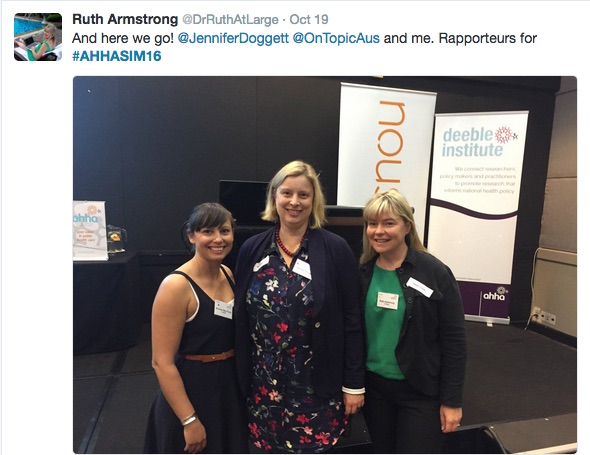
The scenarios resonated for most people in the room, fuelling the realisation that everyone the same barriers and frustrations, and setting the scene for collaboration and integration.
Through informal cross-sectoral collaboration, the groups were able to discuss some innovative proposals, ideas and solutions.
The breadth of perspective and experience in the room ensured that everyone’s focus was widened, and enhanced contextual discussion.
Room for improvement
Despite having at least one person in each group take on the role of the patient, focus often quickly slipped away from this person.
When they got the floor, the patient/consumer voices were extremely valuable and there were some clear strategies that worked to promote consumer involvement. These included:
- Having multiple consumers in the group
- Including carers/family members who provided useful input that was symbiotic with the patients’ perspectives.
- The facilitator seeking the consumer’s feedback, and the group working together to privilege the consumer voice.
In future simulations, it may be useful to ensure that these strategies are used across all groups.
The multi-sectoral approach called for a large number of participants in each group, but group dynamics of 30 people meant that some voices were not heard. Participants were asked to hand in their written notes to AHHA; it will be interesting to see if any gems emerge.
Participants interpreted the invitation to role play in different ways. As they were playing roles close to those they play professionally, some felt a need to defend their turf.
On the other hand, much of the time there was virtually no role play at all, and the “simulation” became a roundtable/workshop discussion of hypothetical scenarios. This impacted upon the type of discussions that took place and the group outcomes.
Some “groupthink” emerged, with the use of jargon and circular discussion of “wicked problems”. Debates over the minutiae of specific terminology and differing beliefs about the intersection between health and social needs sometimes held up the discussion and distracted from the main issues.
To really think outside the box, participants in future events might need some training in how to conduct a simulation before the sessions begin.
Taking it home
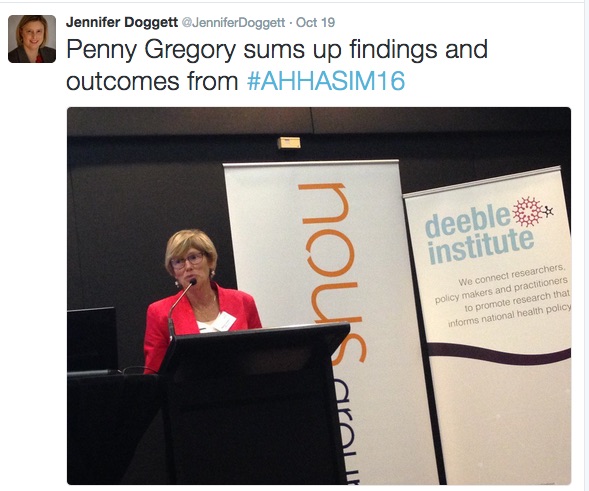 The purpose of the day was to “test” new policy initiatives with some of Australia’s best health minds. It shouldn’t be a surprise, given the complexity of health and healthcare, that the simulation highlighted areas of concern. What we shouldn’t lose sight of is the passion that the people in the room had for health care and that solutions are being proposed.
The purpose of the day was to “test” new policy initiatives with some of Australia’s best health minds. It shouldn’t be a surprise, given the complexity of health and healthcare, that the simulation highlighted areas of concern. What we shouldn’t lose sight of is the passion that the people in the room had for health care and that solutions are being proposed.
We have a great health system in Australia which is easy to forget when you are focusing on testing a policy in this way. The fact that the conversations are happening demonstrates our health care sectors desire to move as close as possible to a perfect health system.
An overarching message was the need for the reforms to deliver more coordinated and integrated care across the aged, disability and health care sectors.
This means building flexibility, capacity and innovation into the system to ensure that it can evolve to meet the changing needs of the community.
System changes must be co-designed with consumers so that we can move away from a system centred around the needs to service providers to one reflecting consumers’ needs and priorities.
New technologies are potentially transformational, as illustrated by the ‘learning loop’ inherent in Uber, where both clients and providers provide feedback on each other which is then made publicly available to inform future clients.
The current reforms and the increased choices these give consumers are a great start, but may require an unpacking of issues around risk management and responsibility.
We need to move away from a system that provides services TO people towards one that works WITH people to achieve their goals – consumer representative.
In conclusion: rising to the task
Ruth Armstrong, Jennifer Doggett and Summer May Finlay write:
When Roma Street Station was opened in 1875, nobody could have envisaged the capacity and complexity of the transport system it would need to support in 2016.
Each step in growth must have taken planning, commitment, investment, skilled workers and vision.
The Simulation was a living illustration that Australia’s diverse health, disability and aged care workforce is full of enthusiasm, and agile to the policy changes that will have profound effects on the way they work.
There has also been political responsiveness and planning: game-changers like the NDIS and Healthcare Homes, if adequately supported, could return people to their rightful place at the centre of their own health needs.
Do our leaders have a vision, and sustained commitment to the task of improving the nation’s wellbeing? And is there sufficient investment?
These questions hovered in the air as the simulation participants dissipated into the evening peak hour.
Some of us even rolled our luggage onto the platform at Roma Street, skipping the heavy traffic in favour of a perfectly-timed express train to the airport.
Snapped and tweeted
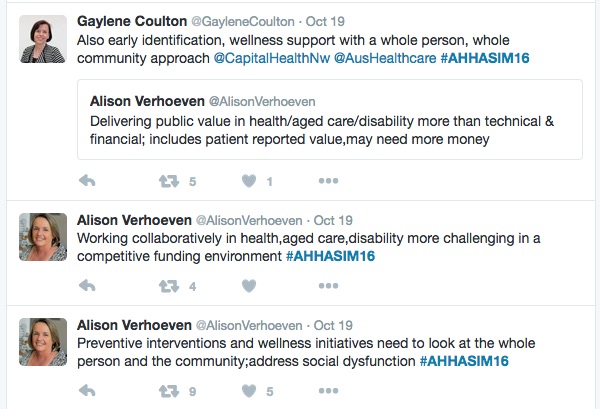


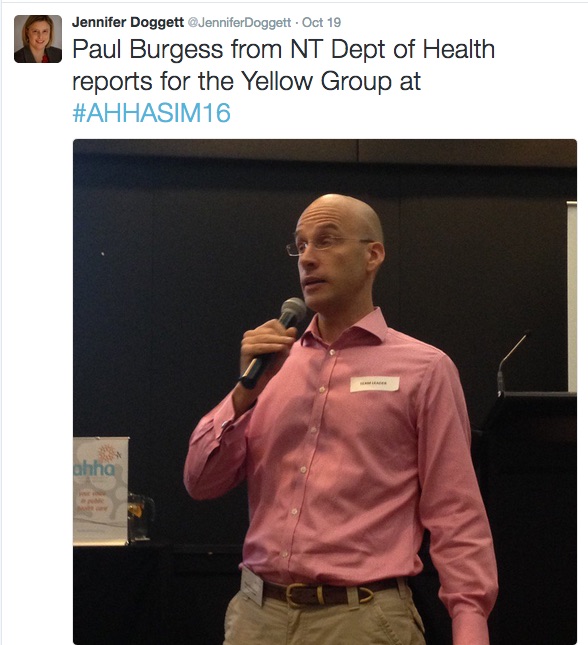

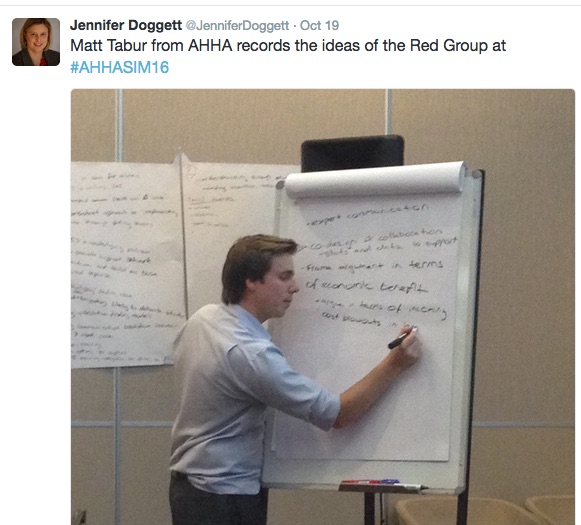
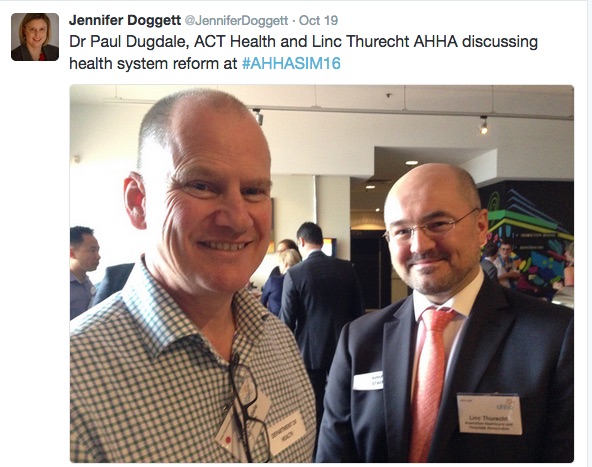
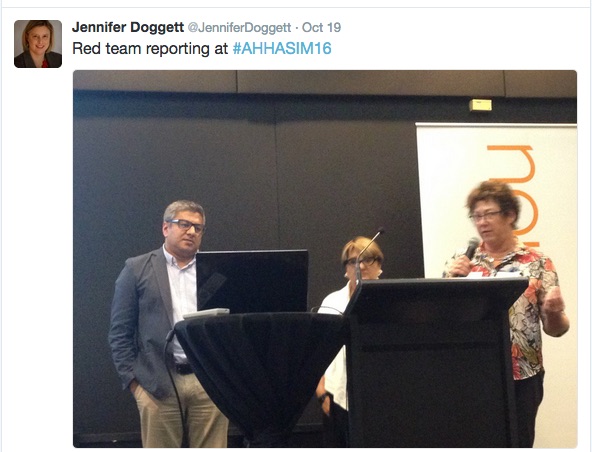
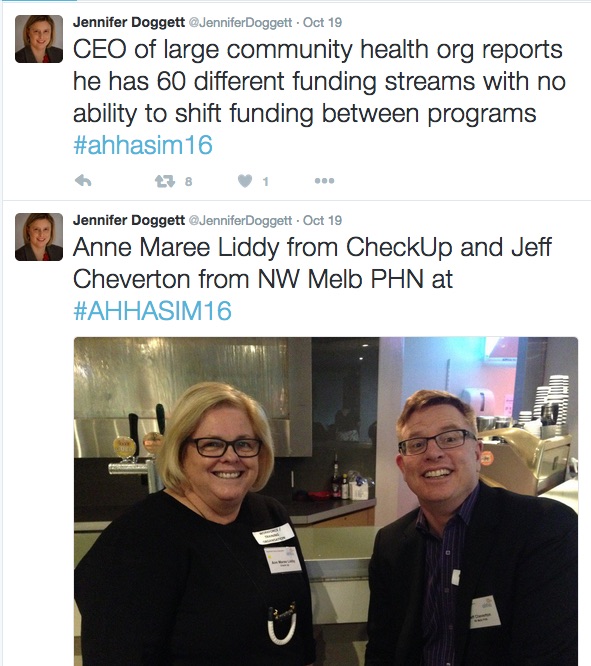

On the evening before the simulation, the Sax Medal was presented.




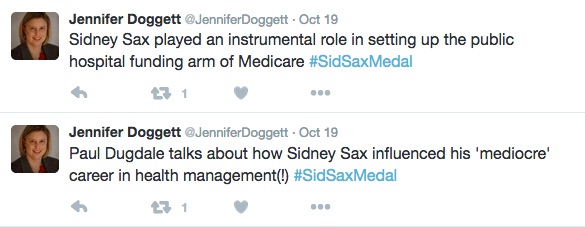
The Australian newspaper’s Health Editor Sean Parnell also addressed the function.
(Note Jennifer Doggett’s accidentally descriptive mention of The Courier Mail newspaper).



PostScript: Who said that it’s impossible to get complex policy matters trending?











